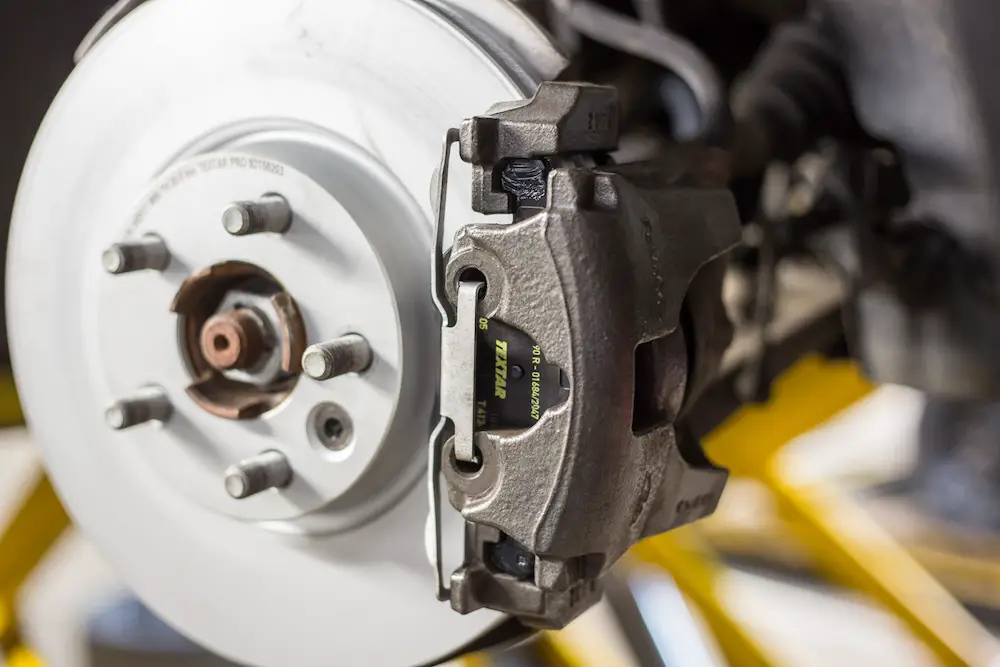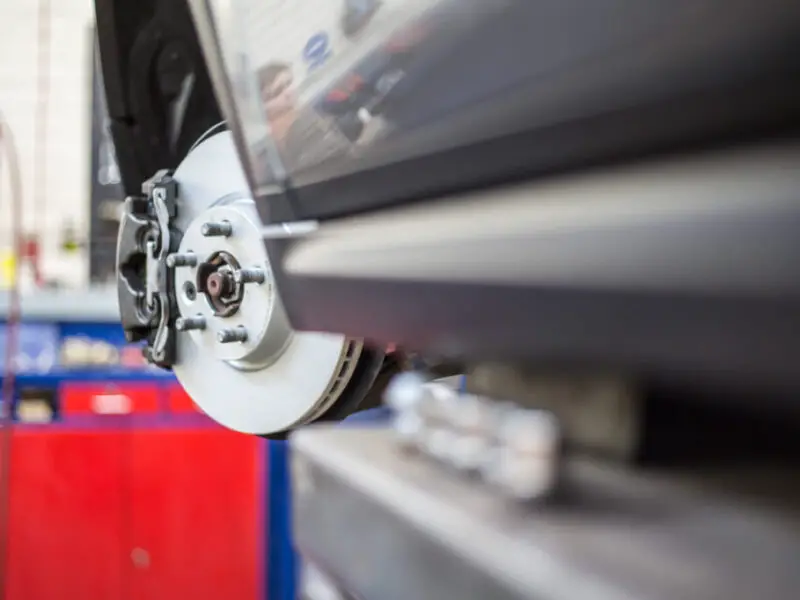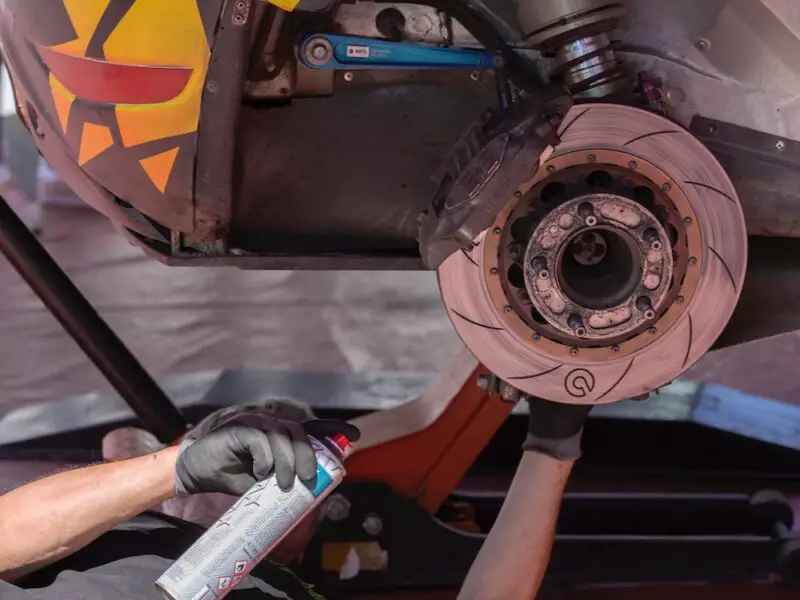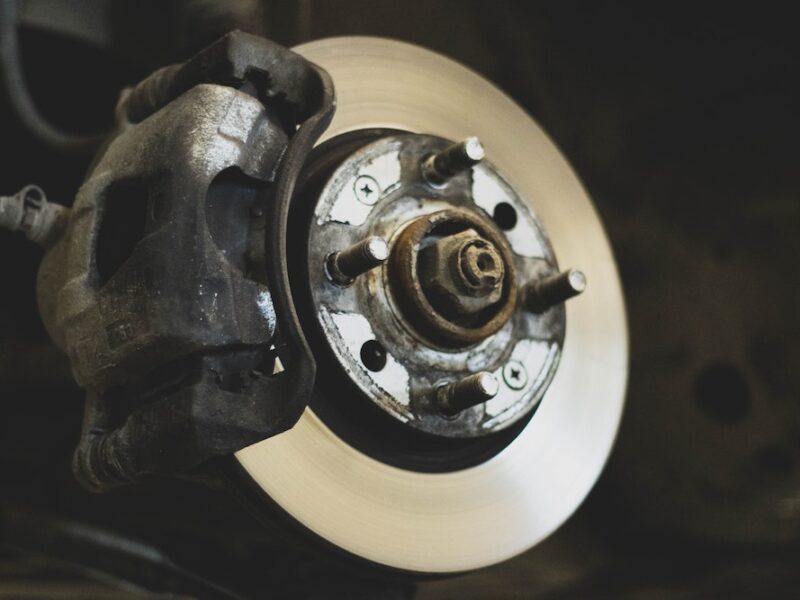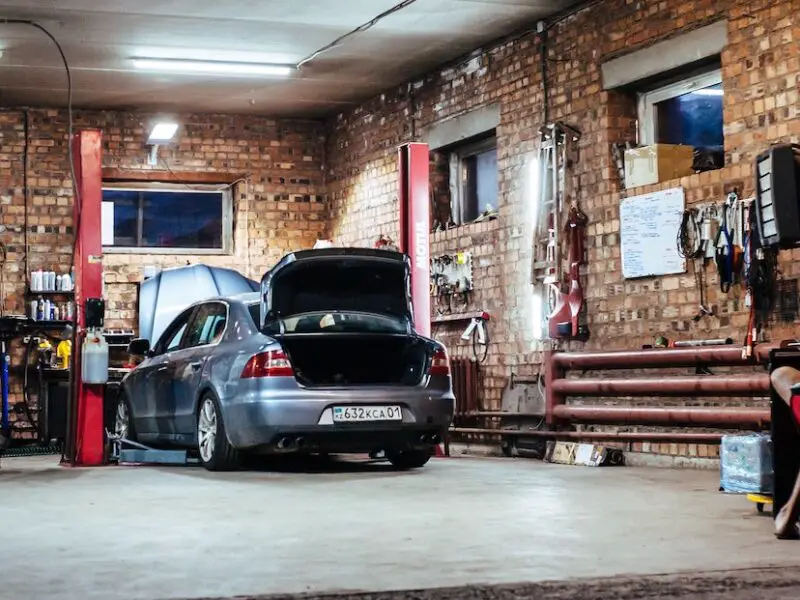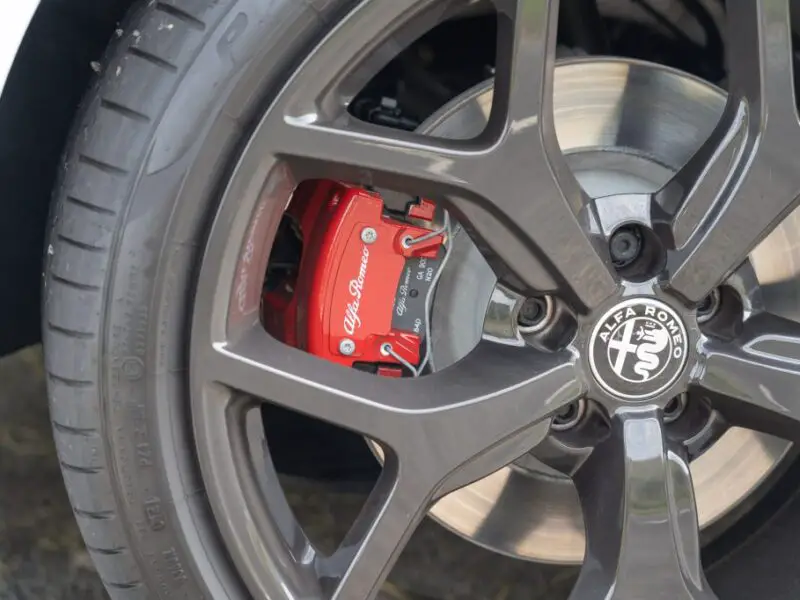One of the most important parts of your car’s braking system is the brake fluid. It ensures that the pressure that the driver applied by pressing down on the brake pedal is transferred to the wheels which then results in the slowing down and stopping of your vehicle. But what causes brake fluid leaking from caliper?
One of the main factors which can result in the brake fluid leaking through the caliper is a faulty or worn-out O-ring.
Other times you may find that it is the piston that is faulty and requires immediate replacement. Furthermore, you may find that the caliper is fractured resulting in a leak of brake fluid.
One thing is for sure, brake fluid leaking from caliper is never a good sign and is an issue that requires immediate attention and repair.
- Brake Caliper
- Brake Line Repair
- Low Brake Fluid Symptoms
- Bad Caliper Symptoms
- Frequently Asked Questions
Brake Caliper
The calipers in your vehicle play a huge role in controlling your car’s acceleration. This is often achieved through hydraulic pressure which is applied to the car brakes this helping to slow down the vehicle.
The brake caliper is located near the brake rotors and comprises metal plates that press against the rotor.
Between the metal plates are pistons which after pressing down on the brake pedal will receive fluid from the master cylinder.
This action results in the piston moving outwards pushing the metal plates towards each other. The brake pads will then create friction against the rotor resulting in the car slowing down.
Calipers come in different types depending on the type of car make and model. There are those calipers that will use one piston while other types will have multiple pistons. The pistons could be as many as eight.
Other than controlling how the car accelerates and decelerates the calipers will also ensure that the car remains stable when you press on the brake pedal.
Whenever you apply the brakes, the calipers help to distribute the force of the brakes to all the wheels of the car. This will help to stop the car from veering off course.
To ensure that the brake calipers are working as they should regular maintenance is needed. It is a good idea to inspect the brake rotors and the brake rotors for signs of wear and tear. Whenever the brake pads are worn down, you will need to make a fast replacement.
You may also need to service your brake calipers every so often depending on your car’s make and model.
Brake Line Repair
The brake line is another important part of your car’s braking system. Let’s consider the role of the brake line.
After pressing the brake pedal the pressure is transmitted to the master cylinder. This will then force the brake fluid through the brake line.
The brake line is also known as the brake tubing or the brake pipe.
Each wheel also has cylinders which then receive the brake fluid. This will then cause the braking mechanism to engage.
Now the calipers as well as the brake pads will squeeze onto the brake rotors. This will create friction and cause the car to slow down and eventually stop.
Some car models have drum brakes. This doesn’t use brake rotors. In this case, it is the wheel cylinder that will activate the brake shoes resulting in the car slowing down.
One question that many drivers will have is whether the brake hose is the same thing as the brake line.
Note that the brake line will be rigid and will be similar to the fuel lines that you find in your fuel tank. However, the brake hose will often be made out of rubber and is connected to the rigid brake line and the other end to the moving components of your brake system such as the caliper.
The benefit of having flexible brake lines is that they can flex with the wheel suspension. That said you may find that your car features stainless steel braided hose.
These flexible stainless steel lines will have the advantage of being durable compared to rubber hoses. This then means that you will not have to replace them too often.
What If The Brake Lines Sustain Damage
Now that you understand the brake line, let’s now consider what would happen in case the brake line in your truck is damaged.
The first thing that could happen is a complete failure of the brake system. This is because there will not be brake fluid in the line to help activate the moving parts of the brake system.
Some car models will feature a couple of separate circuits. This will help to prevent the entire braking system from failing resulting in a split brake system.
These separate circuits could either be:
Diagonal – this features a single set of brake lines that control the left rear brakes and the right front brakes. A second set will then control the left front and the right rear brakes.
Front rear – here a set of brake lines will control the front brakes and another set will control the rear brakes.
In such a brake setting, having one brake line fail means that you will still be able to rely on the other functioning line.
For instance let’s assume the rear brake line was to fail and you had a front rear brake configuration, you may find that the back of the car jumps after engaging the brakes. This is due to the rear brakes failing to work. This will then cause skidding.
The great thing is that the front brakes will still be working. This will allow you to still bring your vehicle to a stop.
That said, if all of the brake lines were to fail then you will be losing all of the brake functions.
How You Can Find Issues With The Brake Lines
Brake lines are a durable component and will last as long as your car lasts. This however isn’t always what happens.
Let’s find out how you can tell that your brake lines have issues or are failing.
Brake Fluid Leaking From Caliper Or Brake Lines #1: Braking Power Has Gone Down
One sure way that you have faulty brake lines is when you notice that the braking power has gone down. You can easily tell that the braking system is having difficulty bringing the car to a stop.
Note also that this isn’t the only cause of a drop in power with the braking system. Other factors that could cause it included issues with the other components of the car’s braking system.
It is best therefore to take your vehicle to a qualified mechanic to have the problem diagnosed and fixed.
Brake Fluid Leaking From Caliper Or Brake Lines #2: Dashboard Brake Light On
If you see that the brake warning light on the dashboard has turned on then there are a couple of things that this could show.
Firstly, this could show that there are low levels of braking fluid in the master cylinder. This could especially happen with older car models.
Secondly, this could be because you have engaged the parking brake.
One thing to also note is that low levels of brake fluid in the master cylinder are often a sign of damaged brake lines.
Brake Fluid Leaking From Caliper Or Brake Lines #3: Leakage Of Brake Fluid
You may find that the brake fluid is leaking on the ground. When the brake fluid is new, it will often be transparent and yellow.
Over time this color can change to brown. It is a good idea to always check the brake fluid reservoir to see if there is a potential leak of the brake fluid.
Brake Fluid Leaking From Caliper Or Brake Lines #4: Notable Damage To Brake Line
You may also be able to visually notice damage to the brake lines such as corrosion as well as cracks. Cars that are often parked for a considerable amount of time will often have rusted brake lines.
The brake lines are more likely to also happen in cars that are driven in snow. This is owing to the rock salt which is often used to thaw icy roads.
Brake Fluid Leaking From Caliper Or Brake Lines #5: Brake Fluid Leak
Whatever the type of car you drive whether it’s a Mini or a Ford Mustang, you may have noticed sports under your car of yellowish or even brownish liquid that is near the wheel. If you were to touch the fluid, you would notice that it feels slippery.
This is brake fluid that is leaking from your vehicle.
Let’s take a look at how the car’s braking system works. One thing you should know is that it is a closed system. The braking system will feature a brake pedal, a couple of switches, brake lines, a reservoir, pistons, brake pads, cylinders as well as brake fluid.
Some components which include the brake lines and the master cylinder remain in a fixed position while others such as pistons will move.
If any of the components of the braking system sustains damage, then this could result in a leaking of the brake fluid. This can in turn result in a loss of braking power and loss of performance.
This is why you must ensure the braking system is in proper working condition. This will help ensure that your vehicle is safe to drive.
Simply put the brake fluid is an essential and highly important fluid for your vehicle. It will transfer the movement of the force when you press down on the brake pedal. It is clear that if there is a leak of the brake fluid, then there will be a loss of the brake pressure.
Why Brake Fluid Leaks
Let’s now take a look at the reasons that could cause the leaking of brake fluid.
Whenever the car is leaking brake fluid, there will be a trail that can be anywhere from light yellow to dark brown. The color depends on how old the brake fluid has been in the car.
Brake fluid could also be a similar color to normal motor oil. Whenever you believe that the vehicle is leaking brake fluid start by checking under the car near the master cylinder as well as around the brake lines. You can also check under the rotors as well as on the drum.
Dirt often accumulates on slow leaks. In case you notice caking of dirt, then you should wipe the dirt and then inspect the area.
If worn brake pads or brake shoes are depending on the type of braking system, this could cause the pistons which push the pads or the rotors to hyper-extend. This in turn could cause the seals to break and cause the fluid to leak.
If you press on the brake pedal and you notice that it feels extremely soft and doesn’t go back up to its original position, then this is a sign that there has been a significant brake fluid leak.
In this case, you should pull off at the side of the road in a safe area and give the braking system a thorough inspection. It would also be wise to call in a professional auto mechanic. Remember to also check the reservoir in the brake master cylinder and ensure that you have adequate fluid.
Parts That Could Leak Brake Fluid
There are several areas where the brake fluid could leak. When you know the parts that are more likely to leak, you will be more proactive than reactive when it comes to fixing and repairing these parts.
These are:
1. Brake Lines
The brake lines connect to the master cylinder to the underside of the car through components along the way as well as inside each of the wheels.
The brake lines are made to be durable parts and can withstand a variety of road conditions as well as weather conditions. They can however experience wear through corrosion and rusting and this is why it’s important to check them for any damage as well as fluid leaks.
2. Other Components
Other brake components are often not the first suspect when it comes to fluid leaks. That said, they can also experience vibration, hazards, dirt, and debris which can cause the fittings to loosen and can also affect the cylinder and reservoir composition.
When the pistons are hyperextended as a result of the worn rotors, brake pads, shoes, and drums, then this can result in damage which can cause leaks in the fluid.
3. What You Need To Do
If you have noticed that your brakes are leaking fluid, make sure to have your vehicle inspected by a qualified mechanic as soon as possible. It is never a good idea to put your life and the life of your passengers as well as pedestrians at risk by driving with a damaged brake system.
Low Brake Fluid Symptoms
Many people do not pay close attention to their vehicle’s brake fluid. This is however one of the most important parts of your car.
One thing to always keep in mind is that the vehicle’s braking system is hydraulic. This is to say that it will rely on the brake fluid. It will help generate enough pressure to slow down and eventually stop your car.
When you step on the brake pedal, the resultant pressure is transmitted through the brake fluid and into the pistons. These extend and push the brake pads against the rotors. This action creates friction which then stops your vehicle.
If there is a leak or if there is air, then this will drastically affect the hydraulic pressure which will in turn reduce the braking power.
How To Know You Have Low Brake Fluid
There are a couple of ways that you could tell that you have low levels of brake fluid. These are:
- Brake warning light on the dashboard
- Spongy brake pedal
- Low, and discolored brake fluid
- The car takes much longer to stop
If you notice that something isn’t quite right with the car’s brakes, then you must take your vehicle to a qualified mechanic.
Driving around with faulty brakes can increase the chances of an accident.
By doing regular inspections, and vehicle maintenance you will be able to avoid leaking brake fluid. You may also want to check your car owner’s manual for advice on when and how regularly to change your brake fluid.
Bad Caliper Symptoms
If you are having problems with your car’s brake calipers, you likely want to know the most efficient way to handle the problem. It’s important that you first understand how the brake calipers work.
Whenever you press down on the brake pedal, the kinetic energy of the rotating wheels is turned into heat through friction. If you press down on the brake pedal then this force is amplified.
It will then send the force into a piston that is situated inside the car’s master cylinder. This will force the brake fluid to get into the brake lines that travel to each of the wheels.
The brake fluid will then activate the brakes which will then force the brake caliper to squeeze onto the disc. This will then cause the wheel to stop spinning and the vehicle to stop.
But how do you tell that the brake calipers need repair or replacement?
The brake pads are the parts that are most prone to wear even with normal use. Brake calipers on the other hand will last the entire life of the vehicle.
That however will not happen sometimes. In case there is a failure of the brake calipers, then the brake pads will often wear out faster than they normally would.
Brake Fluid Leaking From Caliper, Symptoms #1 – Pulling To One Side
Whenever you are driving on the highway, do you notice that the vehicle is pulling to one side especially when you try to slow down? The calipers will house pistons that move in and out when you press on the brake pedal.
Sometimes the pistons could freeze as a result of dirt and debris or even corrosion. This will cause the pistons to fail in releasing the rotor. They may also not come into contact with the rotor in the first place.
In the first instance, the vehicle will pull to one side. This will be the side that has the damaged brake caliper.
In case the brake pad doesn’t contact the brake rotor then the vehicle will turn away from the side that has the issue. This could either happen during normal driving of the vehicle or during the application of the brakes.
Brake Fluid Leaking From Caliper, Symptoms #2 – Squealing
You could also notice noises that come from the damaged caliper such as high-pitched squealing. The calipers themselves and not the brake pads often cause this type of noise.
If however, you notice whenever you press on the brake pedal then this could be a result of the brake pads.
When you have a stuck or frozen caliper, you put yourself and your passengers at great safety risk so it is crucial to have your vehicle checked at a repair shop.
Brake Fluid Leaking From Caliper, Symptoms #3 – Uneven Brake Pad Wear
You may notice after a close inspection that the brake pads that are on one side of the vehicle are wearing out more than those on the other side. This could be an issue with the brake caliper.
A car mechanic will inspect the brakes and diagnose and fix the problem.
A clunking sound if you notice a clunking sound coming from the wheels, then it is possible that there could be issues with the bracket which holds in place the brake caliper.
This is not a common issue but it could happen. You should never drive the vehicle. This is because the brakes could lock up resulting in a potentially dangerous situation.
FAQs On Brake Fluid Leaking From Caliper
What Color Is Brake Fluid
The brake fluid should be a clear yellow color and very similar to how it looked when in the bottle. A dark brown color is an indication of brake fluid that has been in use for a long time and needs changing.
What Is A Caliper
The brake caliper is a component often found in more modern car models that houses the pistons and the brake pads. It allows the brake pads to come into contact with the brake rotors essentially stopping the car.
How Much Is Brake Fluid
The cost of brake fluid often ranges between $5 and $30. If you seek the services of a mechanic to help you in adding your brake fluid then this can cost anywhere from $100 to $150 inclusive of labor costs.

